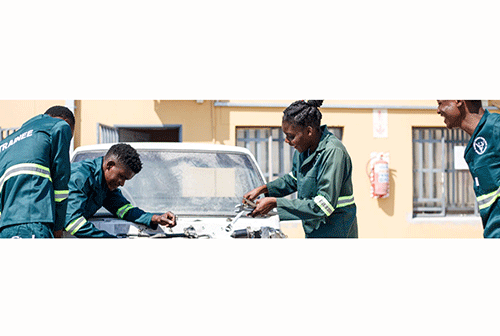Andreas Thomas
Windhoek Vocational Training Centre graduate Victoria Ndapona says it is encouraging that young women are entering technical and vocational education and training (TVET).
“I think it is important that women are going into training in vocational fields. For a long time, men have been the only ones who could do technical work like plumbing, but I am testimony that we women can also do this type of work,” Ndapona said who graduated a week ago in plumbing and pipefitting. She also applauded the government for promoting TVET, noting that it gives young women valuable employment skills. “My advice, especially to young women, is to not only think of going to university. That is not the only way to succeed in life. Try vocational training, and you will make it your life,” said Ndapona.
Alma Hamundjebo, who graduated in auto mechanics, said her fellow women need to ignore the misconception that some careers in the technical and vocational fields are only suited for men. “I chose auto mechanics because I know I am capable. But many women are not going for these types of courses due to the wrong perception that auto mechanics is a job for men,” she said. “I have acquired essential skills that I can use to survive, especially with the high unemployment rate in Namibia. I can overhaul the engine and do other things that many women think they are not capable of doing,” added Hamundjebo.
Hamundjebo, who is from Ondobe in the Ohangwena region, also advised young women to consider TVET. “As we know now, university graduates like teachers are without jobs. So, I am encouraging all ladies to choose vocational education because it will help them in the future. In the absence of jobs, you can open up a workshop and start working for yourself – be your own boss,” she said. The government’s efforts to support women’s participation in TVET) and occupations appears to be having an impact.
The number of women in the technical and vocational fields in Namibia is still low, in part due to the negative stereotype that TVET is meant for men. However, there are signs that women are leading the charge, with many aspiring for TVET occupations. The two were part of 420 trainees who were conferred wi th various national certificates after completing training at the Windhoek VTC between June 2019 to June 2023.
Females made up 36.8% of graduates. Higher education deputy executive director Raimo Naanda who spoke at the ceremony said these statistics signify an increase in the number of female trainees in the TVET programmes and in particular, in the previously perceived occupations for males. He implored the graduates to test their new skills and qualifications to improve themselves and the country. “Most importantly, I would like to implore you to consider becoming self-employed. Youth unemployment is a serious challenge in our country, and it is my sincere appeal to you to consider starting your own enterprises, becoming entrepreneurs and employing others, or even coming together and joining forces.”
“ Employment opportunities are very slim in our economy, and it will be sad for some of you to join the group of unemployed graduates while you possess skills to make a difference. My advice to you is to start small and showcase the skills, knowledge and competencies you possess in your neighbourhoods,” he continued. The Windhoek Vocational Training Centre offers courses in various technical fields including plumbing and pipefitting, joinery and cabinetmaking, bricklaying and plastering, welding, boilermaking, auto mechanic, fitter and turner, electronics,electrical, as well airconditioning and refrigeration and office administration.
The centre has introduced new programmes this year, including automotive mechatronics engineering that is replacing the auto mechanic programme, which was discontinued as a qualification due to changing technologies in the respective occupational area, according to Naanda.
– Nampa



